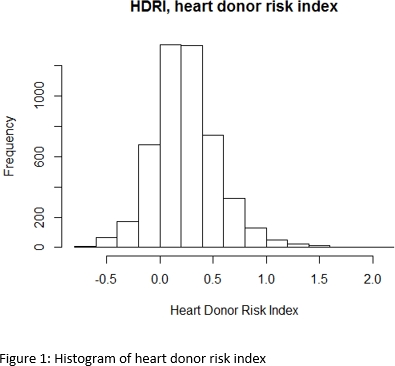A Risk Quantification Score for Heart Transplants: A Heart Donor Risk Index.
1Scientific Registry of Transplant Recipients, Minneapolis
2Hennepin County Medical Center, Univ of MN, Minneapolis
3Univ of Michigan, Ann Arbor.
Meeting: 2016 American Transplant Congress
Abstract number: 16
Keywords: Donation, Donors, Heart, Heart transplant patients, marginal
Session Information
Session Name: Concurrent Session: Challenges in Hearts and VADs - Striking Back
Session Type: Concurrent Session
Date: Sunday, June 12, 2016
Session Time: 2:30pm-4:00pm
 Presentation Time: 3:06pm-3:18pm
Presentation Time: 3:06pm-3:18pm
Location: Room 309
Background: To better risk stratify heart transplants, we developed a continuous heart donor risk index (HDRI) based on heart donors to quantify heart allograft failure.
Methods: Using national data July 1, 2011-December 31, 2013, from the Scientific Registry of Transplant Recipients, we analyzed 4887 heart transplants. Cox regression was used to model the risk of allograft survival, based on donor and transplant factors, adjusting for recipient factors. Model selection was conducted using the lasso method. The models are posted: http://www.srtr.org/csr/current/Centers/201506/modtabs/Risk/HRADA2G.pdf. To create the HDRI, all non-donor beta coefficients were set to 0 and the beta coefficients were calculated using only donor variables. These beta coefficients represent the values for HDRI.
Results: The HDRI includes donor factors associated with graft failure age, clinical blood infection, ABO blood group, BMI, BUN, cause of death, high risk for blood-borne disease transmission, cigarette use, clinical infection, anti-CMV, cocaine use, donor EBV, eGFR (mL/min/1.72m2, calculated from SCr, age, sex, race), ethnicity, sex, HBsAb, hematocrit, history of cancer, history of diabetes, insulin dependence, INR, intracranial cancer at the time of procurement, antihypertensives, DDAVP, heparin, vasodilators , other drug use (non-IV), clinical infection (urine and other source), proteinuria, race, diuretics, steroids, and number of transfusions during this (terminal) hospitalization.
The national distribution of HDRI is shown in Figure 1. A higher HDRI reflects a higher risk of 1-year graft failure, after accounting for recipient and transplant related factors. The average HDRI was higher for heart recipients who died within the first year posttransplant (0.38 vs. 0.23, p<0.001).
Conclusions: The impact of HDRI on allograft failure makes it a useful tool to better risk-stratify heart donor offers.

CITATION INFORMATION: Israni A, Zaun D, Snyder J, Salkowski N, Xiong H, Kasiske B, Colvin M, Colvin M. A Risk Quantification Score for Heart Transplants: A Heart Donor Risk Index. Am J Transplant. 2016;16 (suppl 3).
To cite this abstract in AMA style:
Israni A, Zaun D, Snyder J, Salkowski N, Xiong H, Kasiske B, Colvin M, Colvin M. A Risk Quantification Score for Heart Transplants: A Heart Donor Risk Index. [abstract]. Am J Transplant. 2016; 16 (suppl 3). https://atcmeetingabstracts.com/abstract/a-risk-quantification-score-for-heart-transplants-a-heart-donor-risk-index/. Accessed July 18, 2025.« Back to 2016 American Transplant Congress
